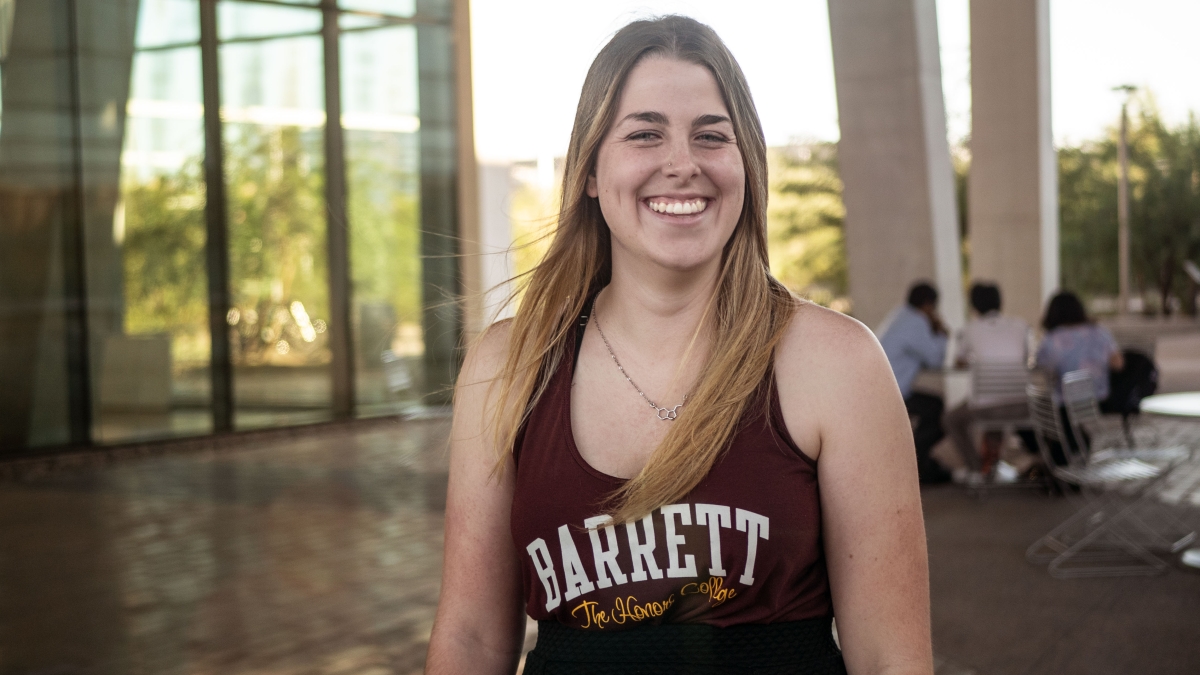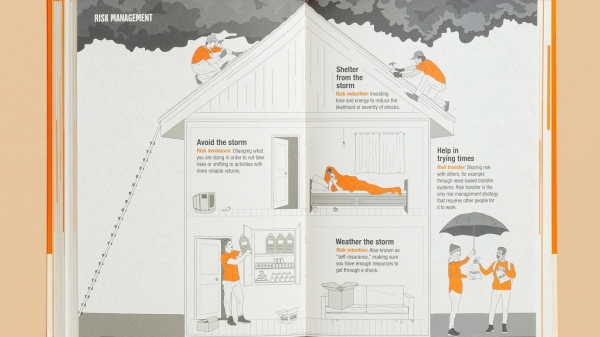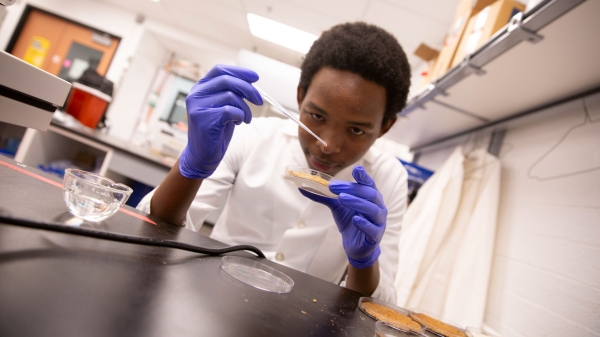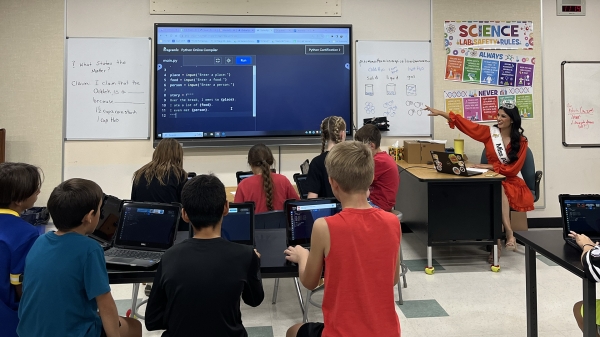ASU psychology student promotes literacy, education for the incarcerated

Winter Roth is a member of Barrett, The Honors College and will graduate in May with a double major in biochemistry and psychology. Photo by Robert Ewing/ASU
According to the U.S. Bureau of Justice Statistics, there are 2,220,300 Americans in U.S. federal and state prisons and county jails. Over 40 percent of Americans believe incarceration rates are too high, according to a poll by Greenberg Quinlan Rosner Research and the Vera Institute of Justice.
Winter Roth, a senior in the Arizona State University Department of Psychology, is among that 40 percent. Roth is the president of ASU’s Prison Education Awareness Club. She also teaches a class that promotes literacy and educational opportunities for prisoners at the Perryville Women’s Prison and will teach psychology there next year.
Roth’s involvement with incarcerated populations began when her mentor, Cornelia "Corri" Wells, invited her to participate in the ASU Pen Project. The Pen Project is an innovative distance-learning program targeted toward maximum-security inmates and other incarcerated individuals in both the Arizona Department of Corrections and the New Mexico Corrections Department. ASU students serve as creative-writing instructors for the incarcerated participants.
“Everything about Roth is like a door opening, another threshold crossed, another promising vista ahead, with only half a glance back at the many successes she leaves in her wake, and only mild regard of who she's still becoming as she glances outward at how she can serve next," said Wells, professor of English and the Prison Education Programming (PEP) Director at ASU. "She is both an exemplary leader and admirable follower — a true colleague in all she does. A joy to work with.”
The Pen Project changed Roth’s preconceived beliefs about the incarcerated.
“It was eye-opening to see how many inmates were so receptive to learning; it really changed my perspective on incarceration,” Roth said. “The members of the Pen Project are some of the best learners I have taught, and they have taught me that everyone deserves a second chance.”
Roth is a member of Barrett, The Honors College and will graduate this coming May with a double major in biochemistry and psychology.
Roth is also a member of the Arizona Twin Project, which is part of the Child Emotion Center. The project is a longitudinal research study working on understanding the influence of genetic and environmental factors on the physical health, emotional development and resilience of children.
“Winter is now completing an honors research project that combines her interests in stress, physiology and health in middle-school children. We know that exposure to stress early in life can increase the risk of developing pain, but most of the research in this area has been conducted in adults. Roth’s honors project is investigating whether the same pattern is already evident in childhood,” said Mary Davis, professor of psychology and associate chair of the Department of Psychology.
“The project is really novel and can help to shed light on environmental and physiological factors that may contribute to risk for chronic pain in childhood,” added Davis.
Roth’s honors thesis is testing whether children’s exposure to family stress at age 3 is related to the functioning of their stress hormone system at age 8 and whether that stress system, in turn, is related to chronic pain at age 9.
Question: What is your hometown?
Answer: I lived in Queen Creek (Arizona), but because my parents are both educators in Gilbert, I went to high school there and spent most of my time in Gilbert. Gilbert feels like more of my hometown.
Q: Did you have an “aha” moment, when you realized what you wanted to study at ASU?
A: Joining the Pre-Pharmacy club at ASU opened my mind to how expansive the field of pharmacology is. We heard from compounding pharmacists, veterinary pharmacists and medication-therapy management providers. This experience led me to my first job as a pharmacy technician at a medication-therapy management center and propelled me toward my desire to become a pharmacist.
Q: What is something you learned while at ASU — in the classroom or otherwise — that surprised you or that changed your perspective?
A: My work with the Prison Education Awareness Club exposed me to the hidden world of social injustice for individuals who are seen as lesser members of society. Before I entered the walls of a prison that are entwined with razor wire, I was terrified to come face-to-face with horrible inmates, who were responsible for various crimes from murder to drug distribution. However, I learned these members are better learners than many of the other populations I have taught. They taught me that everyone deserves a second chance.
Q: Why did you choose ASU?
A: My parents are both ASU alumni, so the university has been a part of my life since before I was born. I wanted to stay in-state because of cost and to be close to my family. The opportunities from student organizations and research were important factors in my choice. These opportunities and my acceptance into Barrett, The Honors College ultimately led me to choose ASU.
Q: Which ASU professor taught you the most important lesson?
A: Dr. Cornelia “Corri” Wells has been my mentor since I sat in her Honors English 102 course in my second semester of freshman year. I never considered myself to be a writer until the end of that semester. Her belief and trust in me allowed me to pick up various leadership positions. I have been an intern for the Pen Project, a lead teacher for a self-pitched business skills course at Perryville Prison, vice president and president of the Prison Education Awareness Club and a teaching assistant for graduate-level students now entering the Pen Project. Wells taught me that I am a leader, and that this world needs people like me to spearhead opportunities for the less fortunate because of social injustice.
Q: What is the best piece of advice you would give to those in school?
A: My four years at ASU have truly gone by in a flash. My advice to other undergraduates at ASU — and elsewhere — would be to take advantage of all the opportunities your school has to offer. I found myself participating in research, clubs, volunteer work, pharmacy jobs and intramurals. All these opportunities enriched my college experience. Use what your university has to offer to find yourself and your future career path.
Q: What was your favorite spot on campus, whether for studying, meeting friends or just thinking about life?
A: My favorite spot on campus is the second floor of the Student Pavilion. I think it is the perfect place to study or meet up with groups. Plus, it is close to the Memorial Union, so I can always take a Starbucks break if needed.
Q: What are your plans after graduation in May?
A: I plan to attend pharmacy school. I currently have a number of offers from both in-state and out-of-state universities, though I have not made a final decision on where I will be going next year.
Q: If someone gave you $40 million to solve one problem on our planet, what would you tackle?
A: I would like to provide recently released or previously incarcerated individuals with a stable job and support system to reduce recidivism. After working with the incarcerated population throughout most of my undergraduate career, I have realized how difficult it is to find work when someone has to check the “Have you ever been convicted of a felony?” box on a job application. I want to give these individuals a second chance and destroy the revolving door that is our prison system.
More Science and technology

ASU author puts the fun in preparing for the apocalypse
The idea of an apocalypse was once only the stuff of science fiction — like in “Dawn of the Dead” or “I Am Legend.” However…

Meet student researchers solving real-world challenges
Developing sustainable solar energy solutions, deploying fungi to support soils affected by wildfire, making space education more…

Miss Arizona, computer science major wants to inspire children to combine code and creativity
Editor’s note: This story is part of a series of profiles of notable spring 2024 graduates. “It’s bittersweet.” That’s how…